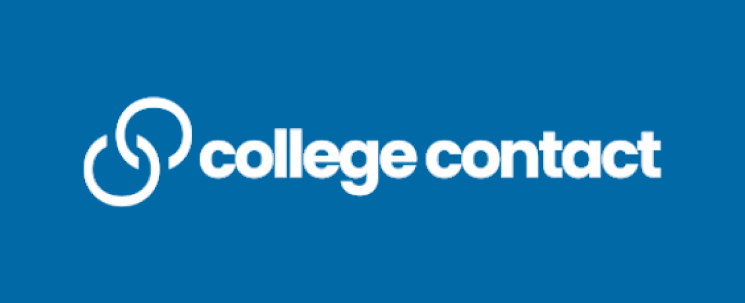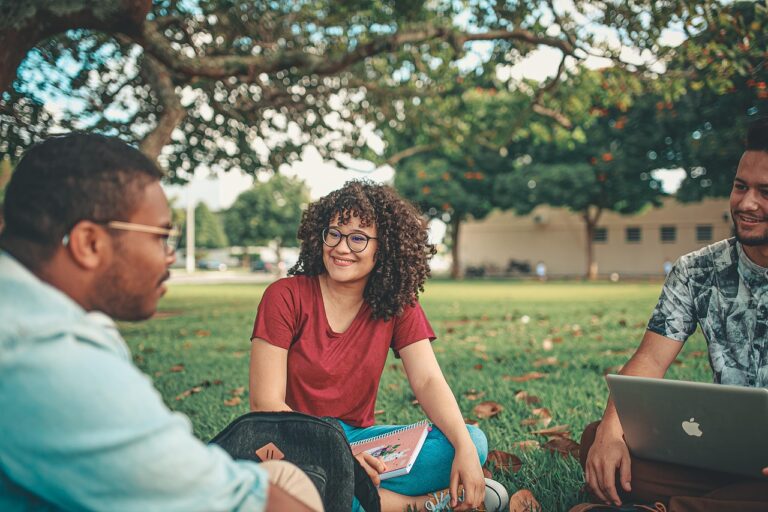2025 Finalist
College Contact

From TikTok to Marketplace: Building the Next Big Network in Postsecondary Planning

The Story of 2025 Finalist College Contact
From TikTok to Marketplace: Building the Next Big Network in Postsecondary Planning
When Sophie Smith posted a short TikTok video during her first year of college, she didn’t expect it to change the trajectory of her life. COVID-19 had just shuttered campuses and disrupted opportunities for students everywhere. “I wasn’t a TikToker,” she says. “I had like two followers — probably my mom and dad.” But the video went viral overnight, bringing in 800 sign-ups and flooding her inbox with messages from students asking for help with college prep, career readiness, and life planning.
“What broke my heart was seeing so many kids say, ‘I have no one to help me,’” Smith recalls. She put up a small website offering to help “a few” students. Within days, there was a waitlist of thousands from across the country.
Realizing the need, Sophie scrapped together a team of a few undergraduates, who from the pandemic, had lost their jobs and internships. Leah Guesman, Sophie’s cofounder and now COO of College Contact, joined after working a DoorDash job.
What the pair realized was a simple marketplace unit economics problem. With 75% of the high school seniors navigating postsecondary pathway planning alone, and an early-career job market gap left from COVID and the rise of AI – the solution seemed simple.
The two turned what began as an accidental side project into a nationally award winning education startup College Contact — a peer-based advising network dedicated to closing the gap left by America’s overburdened school counseling system and provide opportunities for undergraduates to gain critical entry level job experience while earning income and giving back. In the U.S., 20% of high schools don’t have a counselor at all, and in those that do, the ratio is often one counselor to 400 students, leaving most teens with less than 10 minutes of postsecondary advising per year. Private college counselors can charge thousands of dollars — or more — putting personalized guidance out of reach for most families. Meanwhile, the US is experiencing a 5.2 million job internships, and apprenticeships shortage for undergraduates and post-GED workers. With AI job displacement on the horizon, the expectation is that that number will only rise.
College Contact utilizes what they call the “near-peer” advising model -connecting high school students without support to trained and certified undergraduate mentors that they recruit into their network. Students get matched to a team of coaches that reflect their own academic and professional goals, while showing similarities in background, interests and even language. What started as just a few undergraduates, has now grown into a network of over 400 undergrads from 100+ institutions. Over 50% of the coaches identify as people of color, and they speak over 30 different languages with 150+ different career pathways represented.
College Contact partners with public schools and districts, especially those with low counselor counts and high student need, to provide one-on-one, near-peer mentoring at no cost to families. Guesman says, “The time after high school graduation is one of the most important inflection points in a student’s life. Navigating that choice requires trusted, personalized support. The challenge districts face is providing individualized guidance at scale. Our model changes that. By mobilizing carefully selected and trained undergraduates, we give districts scalable 1:1 advising that’s available around the clock, in more than 30 languages, and delivered by mentors who reflect the diverse backgrounds and experiences of the students they serve.”
Since its launch, the team has helped more than 3,000 individual families with college pathway planning, has launched partnerships with districts in five different states, and has won EdTech Product of the Year three times in major international competitions (SXSW EDU, EdTech Week, and InvestHer). Their program with districts is already proving to be fruitful with 97% of students reporting their coach has made them feel more confident about their future, 85% learning critical new postsecondary skills from the advising program, and 52% already requesting more meetings with their coach.
Smith’s vision for the future is both ambitious and adaptive. “In this age of AI, students are facing rapidly changing options for their future,” she says. “We’re always evaluating how we show up for students, families, counselors, and schools and how we can override the traditional systems that create these huge gaps.” Guesman adds, “A lot of college and career planning has been reduced to online quizzes or AI chatbots that leave students feeling disengaged from their futures. When students are empowered to choose a mentor who truly resonates with them and receive personalized, human support, their mindset shifts. They re-engage with purpose and start actively preparing for AND getting excited about what comes next.”
The road hasn’t been without challenges. At just 24, Smith and her co-founder are running their first company, managing contracts and budgets in the millions while wearing the hats of CEO, CFO, and CMO. But their youth is also a strength. “We just went through the system our students are in,” she says. “They feel the authenticity coming from us.”
Currently, College Contact is refining its model to ensure that outcomes align with the key performance indicators (KPIs) of the schools and districts it serves, tailoring its curriculum to meet state standards. Once the model is validated, Smith plans to scale regionally and eventually nationwide.
For Smith, the work is deeply personal and endlessly rewarding. “Being a founder is the best job in the world,” she says. “You get to solve problems, brainstorm with others, and be the first mover in initiating change where it’s needed most.”